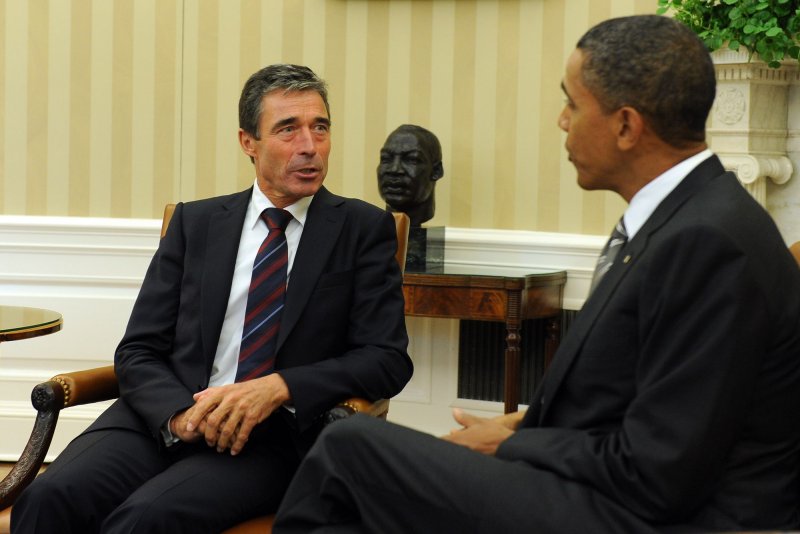Anders Fogh Rasmussen (L), shown Sept. 7, 2010, in Washington with U.S. President Barack Obama. UPI/Roger L. Wollenberg |
License Photo
ISLAMABAD, Pakistan, Nov. 28 (UPI) -- Afghan security officials said Monday a joint U.S.-Afghan raid preceded a deadly NATO attack that left 24 Pakistani soldiers dead.
The Washington Post, quoting Afghan security officials, said U.S. Special Operations forces and Afghan army commandos conducting a night raid against suspected Taliban militants in Kunar province Saturday called in an airstrike after they came under fire from the Pakistani side of the border.
Pakistan rejected the explanation, saying the attack on Pakistan was unprovoked.
White House spokesman Jay Carney said President Obama takes the deaths "very seriously" as NATO forces braced for possible Pakistani-backed insurgent reprisals.
Top NATO-led International Security Assistance Force officers sought to resume contacts with their Pakistani counterparts in the hope of setting up a joint investigation into the incident, which NATO Secretary-General Anders Fogh Rasmussen called a "tragic, unintended accident."
But Pakistani officials -- who maintained the air assault was unprovoked and continued even after Pakistan made clear to the coalition through all possible channels an official checkpoint was under attack -- cut off communications and closed the two main NATO force supply routes into Afghanistan.
Pakistani Interior Minister Rehman Malik said the move would be permanent.
Islamabad also ordered the CIA to vacate western Pakistan's Shamsi air base, allegedly used to launch U.S. Predator drones against militants, by Dec. 11.
A NATO source told the British newspaper The Guardian the Pakistani intelligence agency Inter-Services Intelligence, which NATO suspects has influence over insurgent groups in tribal areas along the Afghan border, would likely launch reprisal attacks on NATO.
"This will come back at us, and at a time and a place of [the ISI's] choosing," the source said.
Pakistan said it was also reviewing its intelligence and diplomatic relations with Washington, and officials said Sunday several upcoming U.S.-Pakistan meetings on reconciliation and other topics were on hold.
In a phone call Sunday to U.S. Secretary of State Hillary Clinton, Pakistani Foreign Minister Hina Rabbani Khar said the airstrike "negates the progress made by the two countries on improving relations."
Clinton's office said as a result of the relationship's deterioration, it might not attend December Afghanistan peace talks in Germany scheduled to include the Taliban because Pakistan now might not participate.
Afghan and U.S. officials view Pakistan's attendance and peace-talk cooperation as critical due to its influence over the Taliban, the Post reported.
ISAF officers say the strike on Pakistani border positions occurred after a joint Afghan-ISAF Special Forces unit carrying out a pre-dawn Saturday counterinsurgency operation in northeastern Afghanistan came under fire.
The 24 killed soldiers, most reported still asleep when the attack occurred, were buried in a military ceremony Sunday in the northwestern city of Peshawar. Thirteen other Pakistani soldiers were wounded.
Maj. Gen. Athar Abbas, the chief Pakistani military spokesman, told the Post and The Guardian the border posts were clearly marked and their locations were known to Afghan and NATO coalition forces.
He also said did not believe militant or military firing preceded the NATO assault, adding coalition troops did not inform Pakistan they were receiving fire from the Pakistani side, which is procedure.
"I cannot rule out the possibility that this was a deliberate attack by ISAF," he told The Guardian. "If ISAF was receiving fire, then they must tell us what their losses were."















